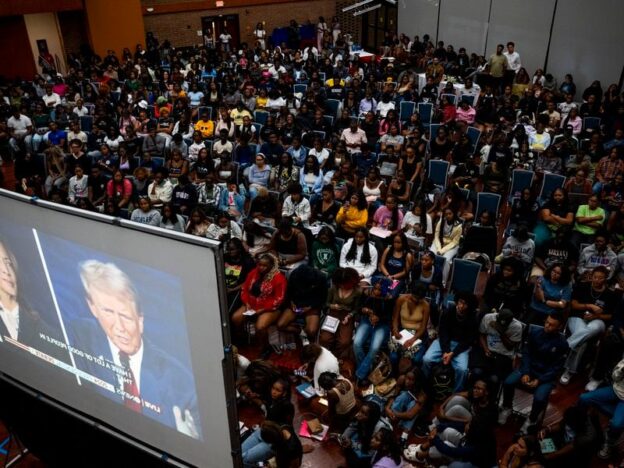A panel of judges grilled attorneys for the U.S. Commodity Futures Trading Commission and prediction-betting platform Kalshi over the company’s efforts to launch political prediction markets in the U.S., without indicating whether they’d allow Kalshi to offer these products while reviewing a lower court’s ruling on the products.
CFTC General Counsel Rob Schwartz and Jones Day Partner Yaakov Roth took turns explaining why an appeals court should or should not block Kalshi from listing these events contracts.
The Thursday hearing came days after a federal judge ruled that the CFTC could not block Kalshi from listing political prediction markets, letting the company list contracts predicting how control of the House and Senate might play out. But it only lasted for a few hours, since the CFTC quickly filed for an emergency stay, which the appeals court granted on a temporary basis.
During the 2.5-hour hearing, the judges did not seem especially impressed by either party, saying various arguments or explanations did not make sense and drilling into specific terms of the Commodity Exchange Act and what they mean. The judges did not get to asking what an event contract actually is until more than two hours into the hearing.
The CFTC’s Schwartz called D.C. District Court Judge Jia Cobb’s Sept. src2 ruling “seriously flawed,” and said it could allow Kalshi – and other companies – to immediately launch “high-stakes” betting markets.
“If that happens, the harm to the public is going to be profound at a time, and I don’t mean to be dramatic, but Americans broadly believe that our democracy is under threat,” Schwartz said.
“In order to obtain a stay, the commission has to show two things: merit, and that there will be some harm, irreparable harm, absent the stay, and they can’t make either of those,” Roth said in his opening statement.
Kalshi saw $50,000 deposited in its two political events contracts in the eight hours or so that the products were live before the CFTC filed for an emergency stay, Roth said.
Market manipulation concerns
The CFTC’s arguments revolve around the agency’s stated inability to police the underlying events – namely, U.S. elections.
Market participants could distort markets to suggest one candidate is doing better than another, Schwartz said, and it would be more difficult to correct than other markets.
A judge posed the hypothetical question of whether a counterparty might take the other side of a bet made for manipulative purposes: “Somebody will take the other side and eat their lunch. Is that what’s supposed to happen?”
That is what should happen, but political prediction markets may be susceptible to manipulation that cannot be easily corrected, Schwartz said.
“It’s because the sources of information that they absorb and reflect are opaque and unreliable. I am talking about polls with undisclosed methodologies, so, bad methodologies, fake polls, pollsters with agendas, inaccurate news, fake news, on and on,” he said. “Normal futures contracts have an objective indicator that is reliable, kind of a published index report.”
If these markets are manipulated, that would both harm the market participants and could even undermine election integrity, Schwartz said. Later in the hearing, he drew a distinction between political event contracts and other types of bets that could be placed.
“There’s really very little monkeying around you can do with an earthquake,” Schwartz said, responding to one example.
Roth, speaking on Kalshi’s behalf, pushed back, saying the more robust a market is, the less susceptible it would be to that type of manipulation.
He pointed to the $src billion already bet on Polymarket, which does not offer services in the U.S. after a settlement with the CFTC, saying the regulator’s argument essentially suggests having an overseas vendor provide these products may be better than Kalshi doing so.
“The most important thing I want to make is that the way to reduce that risk is to allow Kalshi markets to offer because right now, this activity is happening and being reported to voters based on markets that are not regulated, that are open to foreign traders, that have no surveillance. … There’s no transparency,” he said. “We don’t know who’s buying, who’s selling cryptocurrency. If this was happening on Kalshi’s markets, we would have this whole suite of regulatory provisions that apply.”
‘Irreparable harm’
The CFTC needed to show there was a risk of “irreparable harm” in allowing Kalshi to continue listing and trading its events contracts. Todd Phillips, an assistant professor of law at the Georgia State University Robinson College of Business, told CoinDesk it was “unclear if [the CFTC] did that” over the course of the hearing.
The regulator could have done a better job explaining what event contracts actually are and how a state prohibiting gambling on elections counts as gaming for the purposes of the Commodity Exchange Act, he said.
On the other hand, Kalshi also faced tough questioning from the panel of judges on the appeals court.
“Kalshi is making an argument that ‘you should allow us to do something that 29 states prohibit, and that’s big,” he said. “That would be effectively overturning the law in more than half the country.
Marc Hochstein contributed reporting.
Edited by Bradley Keoun.

Comments are closed